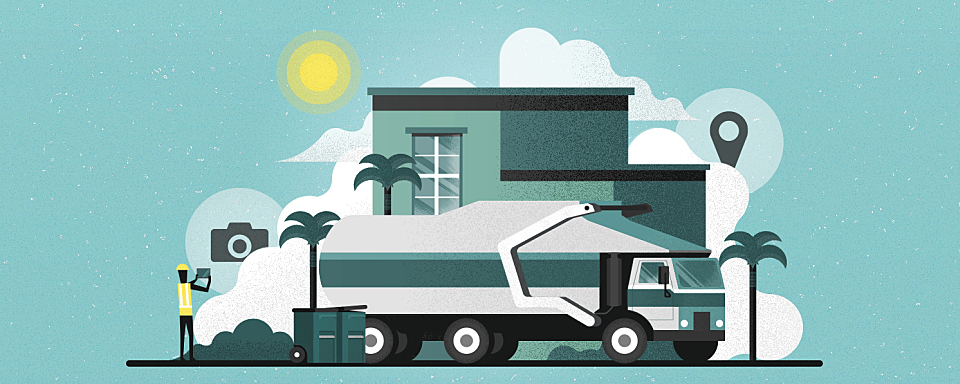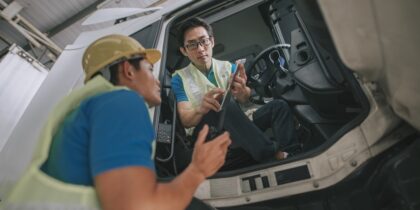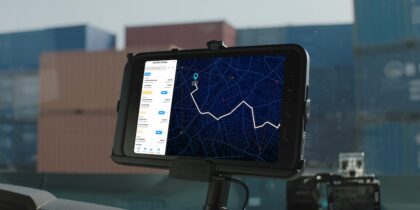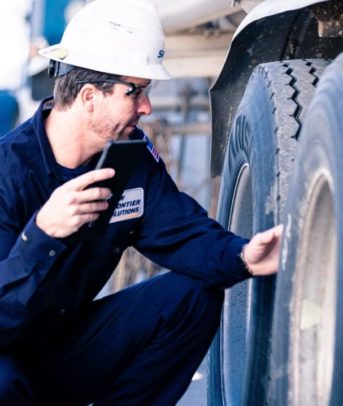Many industries have been quick to adopt mobile technology. Leaders in healthcare, banking and retail have invested in innovative solutions that enable their companies to streamline workflows, provide employees access to key business information from any location, and improve communication and collaboration among dispersed workforces.
Other industries have been slower to embrace this trend. But forward-thinking leaders like Todd Ottonello, vice president of solid-waste disposal company Daily Disposal, wanted to change that.
“Our industry is so technology-poor and old school,” says Ottonello. “The best waste management technology we had in the past was a GPS solution that told us where trucks were and automated hoists to lift and empty containers so drivers didn’t have to do it manually. But with all the new consumer technology, it became obvious there was a better way to manage operations than the pen-and-paper methods we’d been relying on.”
The simple but powerful solution: a custom mobile app and tablets.
Out With the Old
Daily Disposal services tens of thousands of residences, businesses and construction sites in San Diego. In the past, drivers with residential routes received two printouts each morning: a 30-page document listing more than 1,000 customers they needed to visit that day, and a separate five- or six-page document listing customers with delinquent accounts. As drivers made stops, they had to compare the two lists to determine whether to pick up each customer’s containers.
“You could only imagine how complicated that made things for our drivers,” says Ottonello. “They were driving 50,000 pound trucks down the street, flipping back and forth between these two documents. It was easy to make mistakes, and we were serving many customers who hadn’t paid in months and were essentially getting free trash service.”
With more than 90 drivers in the field, Daily Disposal needed a more efficient way to route trucks and document trash pickup. So, the company invested in a custom mobile app called eMobile, Samsung Galaxy tablets with 10.1-inch screens and cellular service from Sprint.
Rather than receiving stacks of paper each morning, drivers simply download the day’s route onto their tablets via the eMobile app. As they move along, the mounted tablets tell them exactly where to stop. When drivers arrive at customers’ homes, they push one of three buttons on the touchscreen: “done,” “not out” or “skip.”
Benefits of Mobile Waste Management Technology
Not only does the new waste management technology improve route accuracy, save paper and simplify drivers’ lives; it also enables Daily Disposal to:
-
Optimize routes: So far, the solution shaves nearly an hour off of existing routes and improves accuracy by 4 percent. But thanks to new visualization capabilities, Daily Disposal is examining routes for inefficiencies and making changes. For example, the company was running three trucks in one area each Friday. By examining how these drivers overlapped each other, Daily Disposal found a way to serve the same customers using only two trucks. “I never expected to park a truck that was serving more than 1,000 homes,” says Ottonello. “This saves us more than $41,600 per year.” Now the company is looking for ways to do the same thing with other routes.
-
Reroute on the fly: Managers and supervisors use Samsung Galaxy smartphones to access the eMobile app and track vehicle telematics. Because they can monitor the locations, movements and status of each driver, they know when individuals are running slower than usual due to bad traffic or excessive trash pickup during the holidays. “The app knows how far along drivers should be,” explains Ottonello. “If someone is falling behind, we send another driver to help. Both drivers are rerouted in real time.”
-
Improve customer service: GPS in the tablets tracks each driver’s location and uploads live time/date stamps into the eMobile app. The home office gets this data in real time, so customers who forget to put containers out in the morning can call customer service to find out if there’s still time. Daily Disposal is currently updating its website to enable customers to view this information online.
-
Document service (or lack thereof): In the past, customers who forgot to put containers out could insist drivers had simply skipped them. “Some customers [did this] regularly, but it was he said/she said, and the customer is always right,” Ottonello explains. “A driver in a pickup truck had to chase route drivers every day and retrieve missed waste.” Now drivers use the tablets to take pictures of houses where containers aren’t out. Customer service reps have instant access to these photos and use them to prove it wasn’t the driver’s fault. “We’re polite about it and offer options, but customers can’t pull a fast one.”
-
Save money: Ottonello says that because the eMobile app runs on consumer-grade devices, the technology is cost-effective and easy to maintain. Several years ago, the company tested another automated system that used desktop computers, ruggedized with military-grade spec boxes and screens. “We spent $110,000 on 10 trucks and needed a full-time IT guy working at night to keep the system running,” says Ottonello. “If something broke, the costs to replace it were huge. If we break a tablet, which has only happened once, we can go to the local store and replace it within the hour.”
Daily Disposal’s entire fleet now has mounted tablets. All residential drivers are using the solution, and drivers who pick up from commercial and construction sites will begin using it soon. And the company is looking for other ways to automate operations. The next step is to add sensors that read the RFID tags in each container and update the pickup status instantly, so drivers don’t even have to push buttons on the app.
“What we’re doing may seem simple, but it’s huge for us,” says Ottonello. “This also helps with our efforts to go green. The solution completely changes an industry.”
Read the case study to find out more about how Daily Disposal has digitized its waste collection operations.








